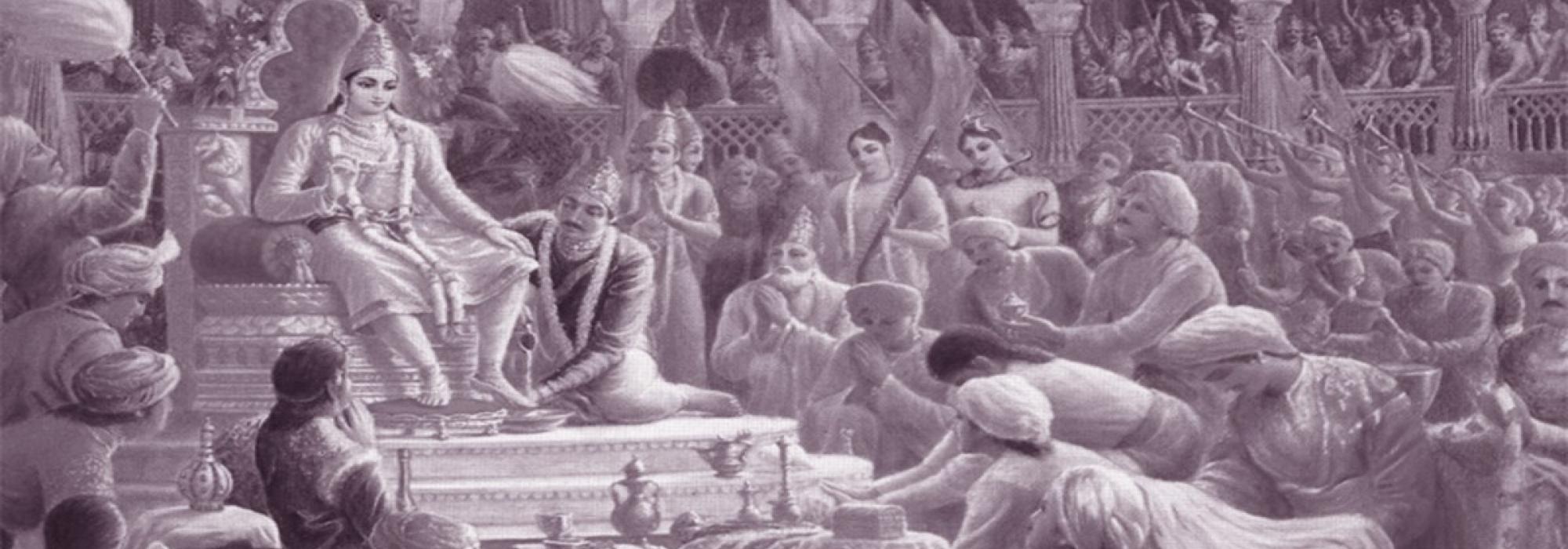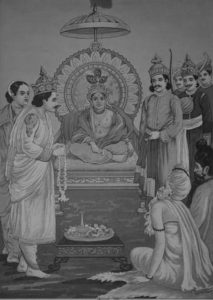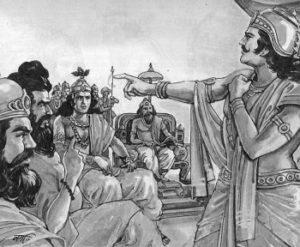With the killing of Jarāsandha, the greatest obstacle for the Rājāsūyayāga was removed. But Yudhiṣṭhira still needed to subdue the other kings or have a treaty of peace with them and gather their tributes. And so, his four brothers, upon his approval, went on a conquest to defeat kings in all directions (digvijaya). Arjuna went to the North, Bhīma to the East, Sahadeva to the South, and Nakula to the West. They defeated the kings there and offered to Yudhiṣṭhira the tributes they had gathered. Thus, Yudhiṣṭhira became the king of kings.
The preparations for conducting the yāga were going on and Dharmarāja was engrossed in a discussion about it when Kṛṣṇa came there. Kṛṣṇa’s entry felt like the sun rising in darkness and a cool breeze blowing in a place devoid of wind. Yudhiṣṭhira joyously welcomed him and said, “Kṛṣṇa, thanks to your support, the whole earth is now under my reign; I have accumulated a lot of wealth and I would like to perform the Rājāsūyayāga. Please take charge of the yāga.”
Kṛṣṇa said, “O Emperor! This is something you need to perform by yourself; tell me how I can help you and I shall do so.” Dharmarāja consented.
The yāga preparations went ahead under the supervision of Sahadeva. Many learned brāhmaṇas came to the city from different parts of the kingdom. Nakula went to Hastināpura and escorted Bhīṣma, Droṇa, Vidura, and other elders to Indraprastha. Dharmarāja welcomed them with much love and respect and said, “All of you should bless me for the smooth execution of this yāga; whatever is mine here, is yours too; you may use all of it, as you please!” Saying so, he took up the charge. Duśśāsana was given the responsibility of managing the food, Aśvatthāma was asked to welcome the brāhmaṇas attending the yāga, Sañjaya was given the duty of taking care of the kings and the elders, Bhīṣma and Droṇa were given the responsibility of guiding them all in their activities.[1] Similarly, Kṛpa was asked to take care of the treasury, offering dāna and the performance of other dhārmic acts. Everyone in the family was assigned a task that matched their capability. Vidura took care of the finances – income and expenditure. Duryodhana had the responsibility of collecting loyalties from the subordinate kings. Most of them offered gems and jewellery in large quantities; nobody offered less than a thousand gold coins; the guests were received with great hospitality; the devatās and brāhmaṇas were pleased by the food and gifts they received; people belonging to all varṇas were contended.
On the last day of the yāga, when they were supposed to offer respects to all the revered ones, Bhīṣma commanded Yudhiṣṭhira, “You will need to offer pūjā to all the kings assembled here. Ācāryas, ṛtviks, in-laws, graduate students, friends, and kings – these are the six kinds of people worthy of receiving pūjā. Thus, offer your respects to every king present here. Before that, find out who is the greatest of them all and offer the agra-pūjā (foremost of honours) to him!” Duryodhana asked Bhīṣma, “Who is the most eligible person to receive the agra-pūjā?” Bhīṣma said that it was Kṛṣṇa. “Kṛṣṇa shines like the sun amidst the plants. He is known for his great intellectual and physical power as well as his dhārmic life. It is due to him that our sabhā has got its brilliance!” Accordingly, Sahadeva offered arghya to Kṛṣṇa, who received it gracefully. Looking at this, Śiśupāla stood up and opposed this act. He verbally attacked Bhīṣma, Dharmarāja, and Śrīkṛṣṇa. “When there are so many senior kings here, this Kṛṣṇa, born in the Vṛṣṇi clan is not worthy of agra-pūjā. Pāṇḍavas! You are but immature lads; you know not the workings of dharma. Just because Bhīṣma, out of his narrow-mindedness, asked you to do so, you’re doing it merely to please him. How can a person who’s not even a king receive agra-pūjā amidst so many kings assembled here? His father, Vasudeva is here; we can call him or perhaps his friend, Drupada, who is a senior king. Speaking of ācāryas, Droṇa—the teacher of all—is here; Kṛṣṇa-dvaipāyana is here as the ṛtvik. If you consider Śrīkṛṣṇa as the most revered one among all, what was the need to invite the rest of us here and insult us? Did we offer our tributes out of fear? We did so because Yudhiṣṭhira was perfoming a dhārmic act that befits a king. And what do we get in return? Humiliation of sorts! You’ve paid great respects to someone who lacks kingly features – can there be a greater dishonour than this? He has killed another king and he is adhārmic by nature; and you consider him the greatest person! Yudhiṣṭhira, can we even consider you a dharmātma? And Kṛṣṇa, just because the Pāṇḍavas offered you agra-pūjā, how could you receive it? Offering pūjā to you is like getting an impotent person married or showing a beautiful image to a blind man. A Bhīṣma who befits a Yudhiṣṭhira, and a Kṛṣṇa who befits a Bhīṣma! What an irony!” Saying so, he left the assembly with the other kings.
Yudhiṣṭhira rushed behind him and requested him with sweet words, “O revered king of Cedi, you have spoken disgraceful words. What is the use of caustic language? Bhīṣma always adheres to dharma, thus, we should not look at him with contempt. There are several other kings elder to you; look how peaceful they are, not letting go of their dignity! Please have patience, Śiśupāla. You do not understand Kṛṣṇa as well as Bhīṣma does!” Looking at this, Bhīṣma said, “Yudhiṣṭhira! Do not try to cajole him; he does not deserve such treatment. If one defeats a kṣatriya in a battle and then lets him go, one acquires the status of his guru. There is no king here whom Kṛṣṇa cannot defeat. Thus, although there are older kings, we have offered agra-pūjā to Kṛṣṇa. Several wise people have praised Kṛṣṇa’s qualities. We have not offered him agra-pūjā expecting something in return or merely because he is our kinsman. Keeping in mind his noble qualities such as wisdom, valour, and affection, we have treated him with great respect. A learned and wise person is revered among the brāhmaṇas. A valorous person is held in great regard among the kṣatriyas. Kṛṣṇa possesses all these qualities. Further, who else can match him in his skill, sincerity, courage, humility, intellect, and renown? Kṛṣṇa possesses all the traits of the six kinds of people who need to be worshipped. Śiśupāla merely wants to oppose this, without having fully realized Kṛṣṇa’s greatness. No king who is endowed with maturity and is in his senses will object to this!” Śiśupāla said, “Bhīṣma! You’re so old in age; don’t you feel ashamed threatening by your words all the kings assembled here? You being the representative leader of the Kurus is like one boat trying to drive another; it’s like one blind man guiding another. It’s surprising that your tongue doesn’t split into a hundred pieces – a tongue that wishes to praise Keśava! Though you’re experienced and learned, you praise this cowherd boy so much! You claim that he killed Pūtanā, but what training does he have in warfare? He might have upturned a cart but is that even a living thing? Lifting a mound called ‘Govardhana,’ which is the size of an anthill doesn’t look like a great achievement to me. The killing of Kaṃsa is no big deal either; killing women and cows is a great sin. A person who has committed such sins is now worthy of praise? The pūjā that the Pāṇḍavas have offered to Kṛṣṇa, heeding to your words, is utterly worthless! You only speak of dharma but never adhere to it! In the past, you brought Ambā who was married to someone else – is that dharma? Vicitravīrya who refused to marry her tread a dhārmic path. You know no dharma, Bhīṣma! If you had served a great person, he would have taught you dharma. Performing a yāga, offering dāna, and doing intense study are not equivalent to producing many children. All rites performed by a childless man are useless. You are a childless man and are guiding your family on a wrong path by preaching adharma to them! You will cause infighting within your family! Although Jarāsandha was a powerful king, he did not fight with Kṛṣṇa because he is a ‘Dāśa.’ Bhīma and Arjuna went to Jarāsandha’s place as per the crooked plans of Kṛṣṇa and deceived him by claiming themselves to be brāhmaṇas. They even killed him by deceit. Does anybody in their right senses say that this was lawful? Jarāsandha, owing to his dhārmic mind, offered them arghya believing them to be brāhmaṇas. He was a great host to them. What kind of dharma is it to kill your host? You are preventing the Pāṇḍavas from treading the path of goodness and they too, foolishly, think that you have provided them the right kind of guidance – how surprising is that!” Bhīma was enraged listening to his words. With knitted eyebrows and gnashed teeth he came charging at Śiśupāla, but Bhīṣma stopped him like stopping an ocean which was flowing over its embankments. Śiśupāla laughed and said, “Don’t stop him, Bhīṣma. Let the kings assembled here witness his worm-like death falling to my fire-like valour!” Yet Bhīṣma stopped him and said, “This Śiśupāla was born with three eyes and four arms; he brayed like a donkey at birth. His parents wanted to discard that infant of an ugly form. Just as they were on the verge of throwing him away, an incorporeal voice said, ‘O King! He is an extremely powerful person; don’t get scared looking at his form; please keep him safe. He will not die because of you and his time has not yet come.’ His mother, out of her affection towards him, asked, ‘Who will kill him, in that case?’ The voice replied, ‘This child will lose his extra eye and limbs when he sleeps on a certain person’s lap and he shall cause the death of your child!’ The child was laid on the laps of several kings but nothing happened; Kṛṣṇa and Balarāma, who happened to hear that their aunt Yādavī had given birth to such a child, came to visit her. After the exchange of pleasantries, Yādavī placed the baby on Kṛṣṇa’s lap and immediately its third eye got dissolved into the body and the extra limbs fell off. Shocked looking at this, Yādavī begged Kṛṣṇa for a favour. She requested him to forgive all mistakes that Śiśupāla commits. Kṛṣṇa said, “O Mother, I shall pardon a hundred mistakes that he makes. You need not worry!” This consoled her. Śiśupāla has become arrogant because of this boon his mother received from Kṛṣṇa and that has given him the courage to speak ill of you.”
Śiśupāla was unable to tolerate this. He screamed at Bhīṣma: “Why do you keep praising him like the Vandi-Māgadhas, Bhīṣma? If you want kings who deserve to be praised, look around you! Here is the king of Balhika and there sits Karṇa. If you want to praise the brāhmaṇas, we have Droṇa and Aśvatthāma here; if any of them gets angry, they have the power to destroy the whole earth. No one will support the incessant glorification of Kṛṣṇa’s character that you’ve been doing. Thanks to these compassionate kings, you’re still alive! They could have killed you long back; there is no one else who has made the whole world his enemy!” Bhīṣma replied with great contempt, “Ah! You say that I’m alive only because these kings have generously let me live? I don’t consider these kings even as equal to a blade of grass!” Some kings assembled there were glad to hear Bhīṣma’s words while some others were irritated. A few of them started saying, “This old man has lost control over himself and he should never be forgiven. Let us all get together and kill him like sacrificing an animal. Or let us light him up in fire!” Bhīṣma said, “O kings, if you keep arguing in this manner, it will see no end. Now, listen to what I’m going to say; then you can kill me like an animal or throw me into the fire. We have offered pūjā to Kṛṣṇa; if any of you wants to die, you may invite Kṛṣṇa for a battle!” Upon hearing Bhīṣma’s words, Śiśupāla expressed his wish to fight Kṛṣṇa. He roared “Janārdana! Come, fight me! I shall finish you off along with the Pāṇḍavas. The Pāṇḍavas seem to have a lot of affection for you from their childhood although you are a dāśa; now they’ve offered agra-pūjā to you, disregarding all other kings assembled here, and you’re not even a king! They have paid respects to an undeserving person like you and are thus to be punished.” Kṛṣṇa addressed the Pāṇḍavas and the other kings assembled there: “Dear kings! Śiśupāla is a great impediment to us. When he learnt that I was away at Prāgjyotiṣapura, he set my city of Dvārakā on fire. He tortured and killed the Bhojarājas who were relaxing on the Raivataka mountain. When my father undertook the Aśvamedgayāga, in a bid to stop it, he kidnapped the horse. On his way back from the province of Sauvīra, he raped Babhru’s wife and kidnapped her. He cheated his maternal uncle and kidnapped Bhadrā for the sake of the king Karuṣa. I’ve tolerated all this out of my affection for my aunt Yādavī. Fortunately now this is going to happen in the presence of several kings; you’ve seen his insolence and his vulgar behaviour in matters related to me; you’ve also heard about his misdeeds. His actions are no longer tolerable. This treacherous knave had even eyed Rukmiṇī in the past but was unable to procure her…” Listening to all this, the kings assembled there admonished Śiśupāla. He laughed out loud and said, “Kṛṣṇa! Are you not ashamed to announce in such an assembly that I had eyed Rukmiṇī in the past? Who else, other than you, will be able to speak such words – that another man was desirous of possessing your wife...” Even as he was saying this, Kṛṣṇa threw his discus at Śiśupāla and chopped his head off. He fell down like a mountain struck by thunderbolt. The kings assembled there were stunned; some of them looked at Kṛṣṇa with admiration; some others squeezed their hands together; some other grinded their teeth in anger; a few other greatly appreciated Kṛṣṇa in their minds, while some others chose to remain indifferent.



















































